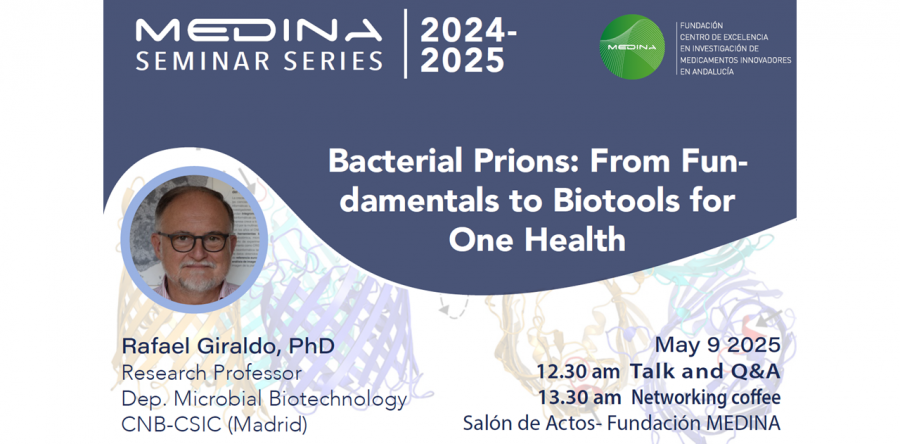MEDINA Invited Seminar Series – Dr. Rafael Giraldo
Granada, 9 abril 2025
Para el siguiente seminario de la serie MEDINA Seminar Series, estamos encantados de contar con la presencia del Dr. Rafael Giraldo. Desde 2010, es Profesor de Investigación del Centro Nacional de Biotecnología – CSIC y miembro de la Academia Europaea. Además, es el Presidente de la Sociedad Española de Microbiología (SEM). El Dr. Rafael Giraldo ofrecerá una charla titulada “Bacterial Prions: From fundamentals to biotools for One Health”.
El seminario tendrá lugar el próximo 9 de mayo a las 12:30 pm en el Salón de Actos de la Fundación MEDINA, Fundación PTS, Granada.
No pierdas la oportunidad de interactuar con el Dr. Giraldo y descubrir de primera mano los avances que está desarrollando en modelos de bacterias como herramientas para el estudio de las enfermedades priónicas. Además, podrás conectar con colegas del entorno científico de Granada y alrededores para intercambiar ideas innovadoras y abrir la puerta a futuras colaboraciones. ¡Esperamos veros allí!
Si no podéis asistir en persona, existe la posibilidad de conectarse al seminario vía Zoom, (registro obligatorio).
Abstract: Prions are proteins with at least two alternative conformations, one of them soluble while the other is a self-templated amyloid aggregate, which is vertically (epigenetically) propagated with cell division and, in some cases, also horizontally transmissible between cells (infectious). In prion proteins, the native and the amyloid conformations have either distinctive functions or the amyloid loses function gaining cytotoxicity. Increasingly found in organisms across the whole Tree of Life, prions arguably are among the most fascinating biological entities by being involved in adaptative response to environmental challenges or in triggering neurodegenerative and systemic amyloid diseases.
Starting from the seminal finding that the WH1 domain in a bacterial protein (RepA) builds functional amyloids to negatively control plasmid replication, we have implemented their use in Synthetic Biology applications including nanosensors for amyloid aggregation and a biosafe minimal model of an intracellular generic amyloid disease, which provides insight on the principles of prion propagation.
We are currently engaged in: A) Exploring the prion-like behaviour of WH1 domains in Rep proteins from plasmids of the prevalent phytopathogen Xylella fastidiosa, paving the way to their possible use in the containment of pathogenic bacteria. B) Engineering an outer membrane porin (OmpF) that enables bacteria to capture and degrade disease-relevant extracellular amyloids present in gut microbiota, which are potential triggers for neurodegeneration, or infectious prions persistent in natural environments such as soils.
– Giraldo R (2020) mSystems 5: e00553-20.
– Vendrell-Fernández S, et al. (2022) ACS Synth. Biol. 11: 655-667.
– Giraldo R (2024) PLoS Pathog. 20: e1012253.






